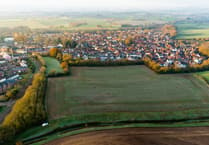A QUANTOCK Hills manor house which Oliver Cromwell ordered to be destroyed during the English Civil War is to be turned into holiday accommodation to help meet the cost of renovating the historic building.
Cothelstone Manor was largely destroyed by cannon fire on Cromwell’s orders because of the Royalist loyalties of its then-occupant John Stawell.
The manor then lay in ruins for 200 years until it was rebuilt in the 19th century.
More recently it was let on a residential tenancy and used as a wedding venue and bed and breakfast from 2006 to 2019.
Hermione Warmington, of the Cothelstone Estate, said it had recently become empty as the tenancy was vacated.
Miss Warmington said the grade two starred listed manor house and the even more important grade one listed gatehouse were both in need of significant investment.
She said urgent ‘critical structural repairs’ were needed in the gatehouse, which was built of squared coursed red sandstone with white lime dressings and was on Historic England’s heritage at risk register.
The work previously could not be carried out because of ‘disproportionate cost’ in return for a residential rent and not being able to access grant funding.
However, Miss Warmington said turning Cothelstone Manor into a holiday let would enable her to undertake the repairs.

As well as the work to the manor house and gatehouse, a redundant courtyard which was part of Cothelstone’s grade two listed Model Farm would be brought back into use.
Miss Warmington said the site was accessed via a shared driveway which also led to the parish's grade one listed Church of St Thomas of Canterbury.
She said the demise of the gatehouse over the past two decades was a result of it not being used and so it was now proposed to convert it into two-bedroom holiday accommodation to be let alongside Cothelstone Manor.
Miss Warmington said: “It is important for it to have an economic use to help justify the huge investment required.
“The conversion will be done to the highest standard and quality, and greatly enhance the building by sympathetically restoring it to its former glory.”
She said there was ‘incredibly strong demand’ for holiday accommodation in the Quantocks, with a local holiday let agent Sleeps 12 seeing nearly 100 per cent occupancy.
The project would create two full-time equivalent jobs for managing the gardens and cleaning and laundry, managed by a local holiday letting agency and thereby supporting an existing local business.
It was also essential to diversify the farming business to help future proof the estate against forthcoming agricultural policy changes.
Somerset Council planning officer Karen Wray, who gave approval for the change of use, said: “The proposed development will bring an empty historic manor house and associated grade one listed gatehouse which is on Historic England’s heritage at risk register into a viable use to ensure the future of the manor and gatehouse.
“The proposal will also bring added benefits to the local economy.”
Last year, the council also approved plans for the restoration of a grade two listed Victorian water wheel on the estate which had been in a state of disrepair for a long time.
The 19th century water wheel in a barn within the farm complex would have been used for turning the farmyard’s grain mill and powering its apple press, milling cereal, and preparing cider.




